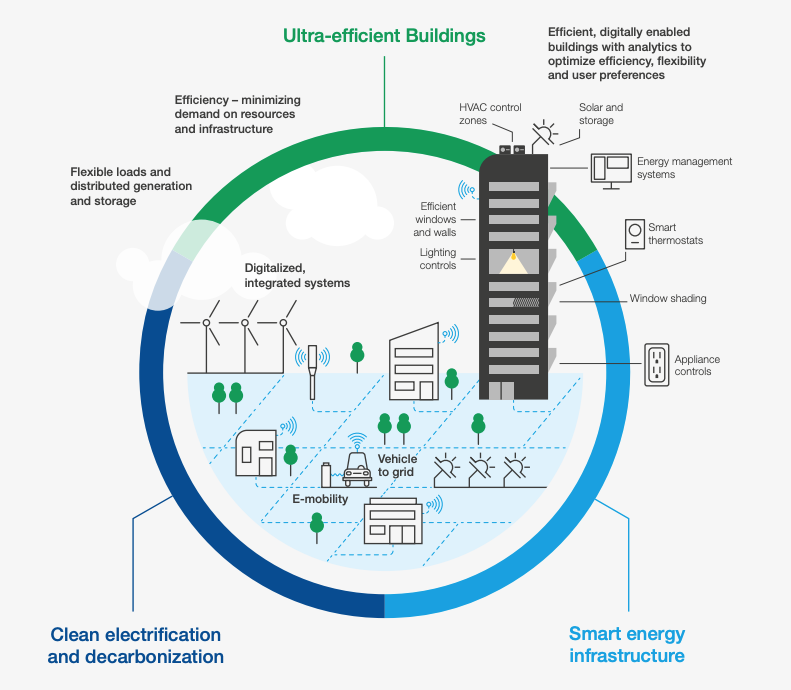This is how we can achieve net zero by 2050, according to the UN

Clean energy is energy from sources that don’t pollute the atmosphere, like solar or wind power.
Image: Unsplash/ Markus Spiske
Stay up to date:
Road to COP26
Listen to the article
- The UN’s Global Roadmap sets out milestones the world must reach to achieve net-zero emissions by 2050.
- It includes no new coal power plans after 2021 and $35bn annual investment in access to electricity by 2025.
- The UN also wants to see 30 million jobs created in renewable energy by 2025.
- Without deep decarbonization, the goal of the Paris Agreement will “fall out of reach,” the UN says.
If everyone had access to clean, affordable energy, the road to a carbon-neutral world – net-zero emissions by 2050 – would be faster.
That’s why the United Nations launched a roadmap for the clean energy transition during the COP26 climate change conference earlier this month.
The SDG7 Global Roadmap outlines how the world can move to clean energy by 2030, as part of the journey to reducing greenhouse gas emissions to net zero by 2050.
Clean energy is energy from sources that don’t pollute the atmosphere, like solar or wind power.
“Close to 760 million people still lack access to electricity,” UN Secretary-General António Guterres said at the launch of the Global Roadmap. “Some 2.6 billion people lack access to clean cooking solutions. And how we produce and use energy is the main cause of the climate crisis.”
Global Roadmap goals
Four years from now – by 2025 – the goal is that 500 million more people will have access to electricity, while 1 billion more people will be able to access clean cooking solutions.
To achieve this, $35 billion and $25 billion needs to be invested into improving access to electricity and clean cooking, respectively.
By 2025, the roadmap also calls for subsidies for fossil fuel consumption to be re-directed towards renewable energy and energy efficiency.
Accept our marketing cookies to access this content.
These cookies are currently disabled in your browser.
The world’s annual investment in renewables and energy efficiency must double over the same time frame.
The UN also wants to see 30 million jobs created in renewable energy and energy efficiency by 2025, doubling to 60 million jobs by 2030.
“These will help ensure an inclusive, green recovery by investing in poverty reduction, health, education and social protection,” the UN says.
Net zero means no new coal
Before this – by the end of 2021 – the roadmap calls for no new coal power plans to be in the pipeline.
By 2030, the roadmap’s goal is that coal power plants be phased out completely for member countries of the Organization for Economic Co-operation and Development (OECD), and phased out globally by 2040.
By 2030, global annual investment into renewable energy, energy efficiency and renewable energy capacity also needs to triple, it says.
The Global Roadmap aims to achieve Sustainable Development Goal 7 – one of 17 Sustainable Development Goals established by the UN General Assembly in 2015. It pledges to “ensure access to affordable, reliable, sustainable and modern energy for all” by 2030.
Achieving the milestones laid out in the roadmap would enable the world to reach net-zero emissions by 2050, says the UN.
Currently, the deployment of renewable energy is lagging, especially in transport, industry, heating and cooling, it adds.
And without deep decarbonization of global energy systems, the goal of the Paris Agreement to limit global warming to 1.5C will quickly “fall out of reach".
What is the Forum doing to help cities to reach a net-zero carbon future?
Accept our marketing cookies to access this content.
These cookies are currently disabled in your browser.
Don't miss any update on this topic
Create a free account and access your personalized content collection with our latest publications and analyses.
License and Republishing
World Economic Forum articles may be republished in accordance with the Creative Commons Attribution-NonCommercial-NoDerivatives 4.0 International Public License, and in accordance with our Terms of Use.
The views expressed in this article are those of the author alone and not the World Economic Forum.
Forum Stories newsletter
Bringing you weekly curated insights and analysis on the global issues that matter.
More on Climate ActionSee all
Tom Crowfoot
July 8, 2025
Duncan Wood
July 8, 2025
Sam Markey, Basmah AlBuhairan, Muhammad Al-Humayed and Anu Devi
July 8, 2025
Giorgio Parolini
July 7, 2025
Will Hicks and Louise Thomas
July 3, 2025
David Elliott
July 1, 2025








